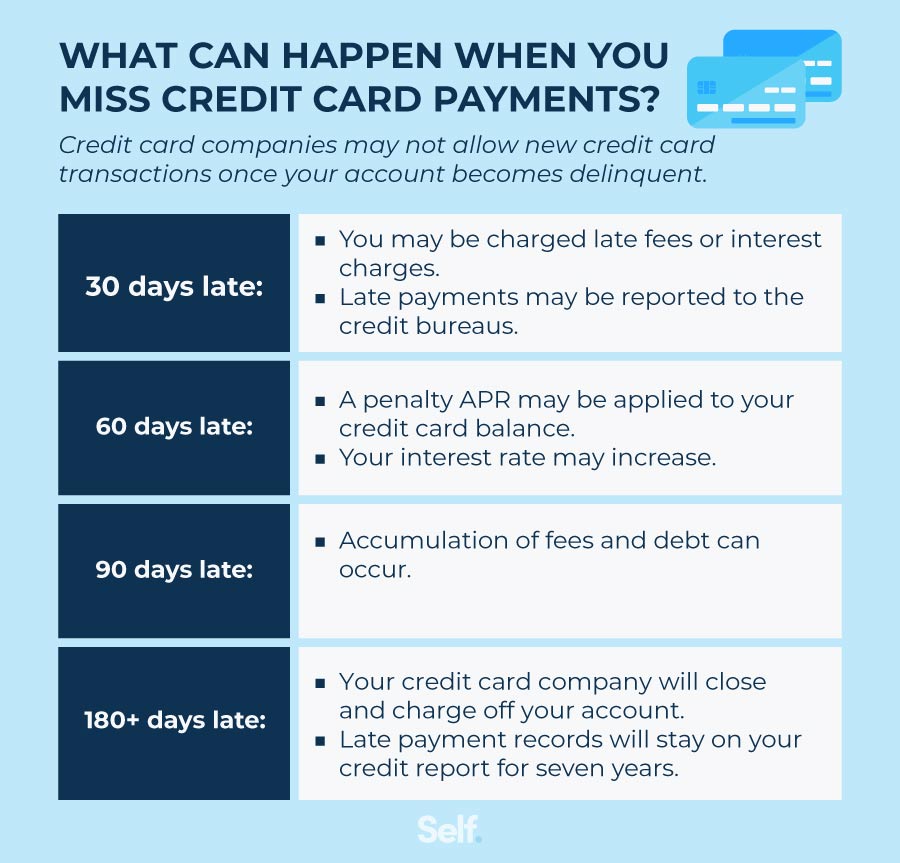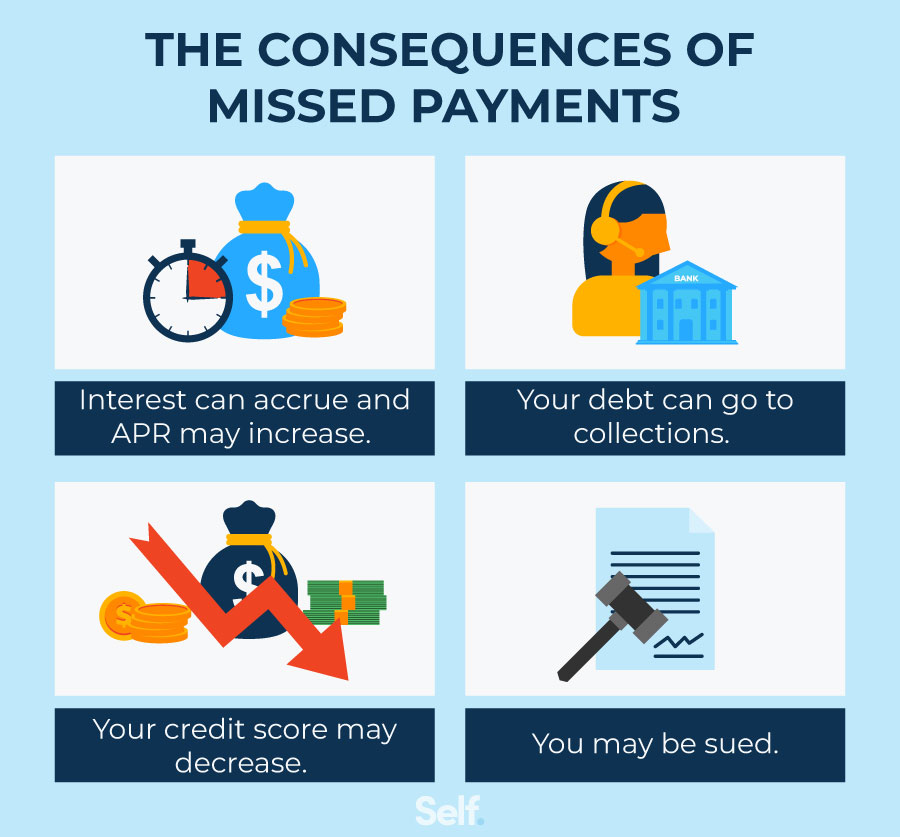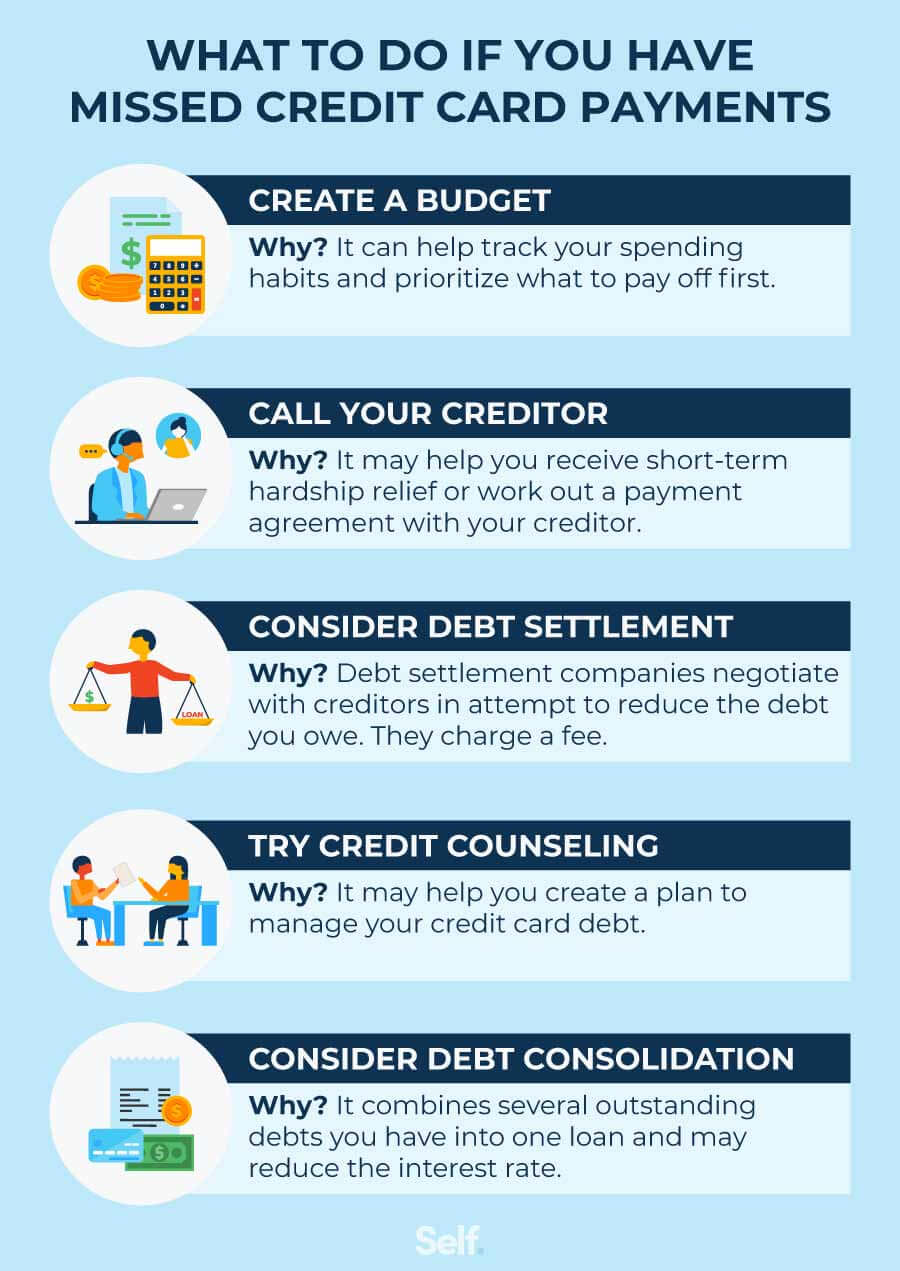What Happens When You Stop Paying Credit Cards?
Published on: 09/22/2024
Not paying your credit card bills can have a number of negative consequences. Interest will accrue, you may incur fees, your credit score can drop, and if the company can’t collect from you, it may sell your account to a collection agency, which may start trying to contact you by phone, email, or even on social media.
A collection agency can potentially obtain a court judgment against you, leading to possible garnishment of your wages or bank account (specific to the type of debt and state where you live.). In short, if you stop paying your credit card bills, it can have a detrimental impact on your credit and finances.
In this article, we’ll discuss what happens when you stop paying credit card bills, and how to get back on track if you have missed payments.
Table of contents
- What can happen when you miss credit card payments?
- What are the consequences of not paying credit card debt?
- Can you go to jail for not paying credit card debt?
- What to do if you have missed credit card payments
- What happens if you don't use your credit card?
- Paying off credit card debt
What can happen when you miss credit card payments?

Missed credit card payments can have a negative effect on your FICO® Score. FICO® is a company that produces credit scores used by lenders as a factor in determining whether to loan you money and, if so, at what interest rate. In fact, according to FICO®, 90% of top lenders use its scores in making this determination.[1]
FICO® uses a system to calculate credit scores that places the most importance on your payment history. It is the largest factor in determining your score, counting for 35%. If your payment is just a few days past due, it most likely won’t count against your credit if you pay right away (although you may still be charged a late fee). However, if you credit card payment is a month or more past the due date, it is likely to affect your score. Here’s what could happen:
- 30 days late: Your credit card company may charge a late fee and report the missed payment to the three major credit bureaus (Equifax, Experian and TransUnion).[2]
- 60 days late: Your credit card company will continue to charge interest and fees and report your late payments.A penalty APR may be assessed, and the interest rate may go up on your credit card balance.[3]
- 90 days late: Your credit card company will continue to charge interest and fees and report your late payments.
- 180+ days late: Your credit card company will close and charge off your account by selling it to a debt collector.[4]
Be aware that credit card companies may not allow new credit card transactions once your account has become delinquent due to failure to make payments.
What are the consequences of not paying credit card debt?

Interest can accrue and APR may increase
When you miss credit card payments, late payment fees can be added to your credit card balances. Credit card late fees aren’t cheap: They can be up to $40 each time.[5] In addition, the interest rate on your credit card may increase to a higher penalty rate (known as a penalty APR).
When you add the interest charges, fees, and your credit card balance together, it can amount to a big pile of unpaid debt. When your account gets overextended, your balance could exceed your credit limit and you will need to pay more than the minimum payment. You will need to pay the minimum due amount plus any amount over your credit limit to avoid additional fees.
Your debt can go to a collection agency
If you fail to make credit card payments after four to six months, your debt may be charged off. At this point your credit card issuer may send your account to a debt collection agency.
You may start to receive phone calls, letters or emails from a collection agency or debt collector, not your original creditor.[6] A relatively new rule also allows them to contact you on social media with certain limitations.[7] In addition, a charge-off, can remain on your credit report for seven years.[8]
Your credit score may decrease
Your credit card company will report your missed credit card payments, and this will be included in your credit report. You can check to see whether this has occurred, and whether there may be errors on your credit report, by ordering a free copy of your credit report.
Typically, you are entitled to one free weekly credit report from each of the three credit bureaus; you can request it at annualcreditreport.com. Checking your credit score yourself does not impact your score as it is not defined as a hard inquiry.
You may be sued
A creditor or debt collection agency can file a lawsuit to recover what you owe if you stop making payments. If a judgment is entered against you, you may have your wages or bank account garnished or a lien may be placed on your property. Keep in mind, each state’s wage garnishment rules will vary, so be sure to contact your state labor department to understand your state’s laws.[9]
Some federal benefits are protected from garnishment, including Social Security, veterans and railroad retirement benefits; federal student aid; military annuities and survivors’ benefits; federal emergency disaster assistance; and Supplemental Security Income benefits.[6]
Can you go to jail for not paying credit card debt?
Your creditor could sue you in civil court if you stop paying your credit card payments, and then they may garnish your wages if they win a judgment against you. However, you cannot be arrested or put in jail for being past due on a debt such as a credit card or student loan.
What to do if you have missed credit card payments

Debtors who are late on credit card payments, or are tempted to skip them because of mounting debt, can take several steps to minimize damage to their credit and personal finance.
Create a budget
Create a budget, track your spending and adjust your habits. There are several methods you can use to budget your money, such as the 50-30-20 plan, envelope method, zero-based or goal-based budgeting.
Under the 50-30-20 plan, 20% of your after-tax income is set aside for savings and debt payments. (Under this plan, you devote 50% of your after-tax pay to needs and 30% to wants.)
There are also budgeting apps available to help you keep track of your finances over the long-term. Monitoring your bank accounts and credit card accounts online and setting up automatic payments can help you avoid being late.
Call your creditor
Contact your creditor to see whether you can work out a payment agreement or receive short-term hardship relief. If you believe a reported late or non-payment is the result of an error, you can notify your creditor and dispute it with them directly. You can back up your claim by including documentation such as a canceled check, receipt, or online verification of payment.
If the creditor determines an error has occurred, the company will send the accurate information to the credit bureaus, which will then correct the error. The updated information may not be reflected on your credit report for a few billing cycles.[10]
It’s important that you only dispute inaccurate information on your credit report. If you have made late payments or missed them altogether, and have been accurately reported late by your creditor, sending a dispute letter won’t help your situation.
Consider debt settlement
You can hire a debt settlement company to negotiate a debt settlement plan on your behalf. You will pay a fee for this service, and it can cost you 15% to 25% of what you owe.[11] If the company counsels you to quit making credit card payments while it negotiates a settlement, you could incur additional late fees and interest in the meantime. In addition, if a settlement is reached, you may also be responsible for paying taxes on the amount you have been forgiven.[12]
Try credit counseling
Reach out to a credit counselor or credit counseling agency. A nonprofit credit counselor can help you create a debt management plan that can get you started in paying down your unsecured debts, such as credit cards.
Consider debt consolidation
You may be able to consolidate all your credit cards into one loan. Consolidating your loans means you can possibly get a lower interest rate in addition to having to make only one monthly payment. If you don’t have a good credit score, however, you may not be able to qualify for a better interest rate on a consolidated loan.
What happens if you don’t use your credit card?
Even if you have consistently paid off your credit card in the past, and you continue to pay off other credit cards, stopping using a credit card completely could impact your credit.
Not using your credit card won’t have an impact in the short term, but if your credit card account is inactive for a long time, the company could close your account due to inactivity.
This could increase your credit utilization ratio if you have other credit accounts open, and over time reduce your length of credit history, especially if you have had the account for a long time. These can both have a negative impact on your credit score.
Paying off credit card debt
Paying off credit card debt can seem difficult, and it can even feel overwhelming if there’s a lot of it. Even if you can’t pay off the whole sum at once, making more than the minimum payment can reduce the amount of interest you pay and shorten the amount of time it takes to pay off what you owe.
You can also pursue specific strategies to pay down debt by prioritizing different payments. Under the snowball method, you make minimum payments on all your debts except the smallest one. On the smallest debt, pay as much as you can until it’s paid off. You then roll over what you were paying on that paid off debt onto the next-smallest debt, and continue the process until you’ve paid off every debt you have.
The avalanche method, by contrast, targets your highest-interest loan first, so you minimize the amount of money you’re paying in interest.
Whatever strategy you use to pay down what you owe, there are ways to get out of credit card debt. Ignoring it won’t make it go away, but with time and patience, you can slowly pay off the debt each month. As you continue to pay off your credit card debt, you’ll understand which method works best for you to help manage your debt.
Disclosure: FICO® is a registered trademark of Fair Isaac Corporation in the United States and other countries.
Sources
- MyFICO. “Your FICO Score, from FICO,” https://www.myfico.com/.
- Equifax. “When Does a Late Credit Card Payment Show Up on Credit Reports?” https://www.equifax.com/personal/education/credit-cards/when-late-credit-card-payments-post/.
- Capital One. “Here’s What You Should Know About Late Credit Card Payments,” https://www.capitalone.com/learn-grow/money-management/late-credit-card-payments/.
- Capital One. “How Long Do Late Payments Stay on Credit Reports?” https://www.capitalone.com/learn-grow/money-management/how-long-do-late-payments-stay-on-your-credit-report/.
- CNBC. “What happens when you miss a credit card payment?” https://www.cnbc.com/select/what-happens-when-you-miss-a-credit-card-payment/.
- Federal Trade Commission. “Debt Collection FAQs,” https://www.consumer.ftc.gov/articles/debt-collection-faqs.
- CNBC. “Debt collectors can text, email and message you on social media now,” https://www.cnbc.com/2021/12/07/debt-collectors-can-text-email-and-message-you-on-social-media.html.
- Investopedia. “Charge-Off,” https://www.investopedia.com/terms/c/chargeoff.asp.
- SFGate. “How Can a Collection Agency Levy a Lien Against Your Home?” https://homeguides.sfgate.com/can-collection-agency-levy-lien-against-home-1693.html.
- Experian. “How Can I Remove Late Payments From My Credit Report?” https://www.experian.com/blogs/ask-experian/how-can-i-remove-late-payments-from-my-credit-report/.
- Forbes. “Debt Settlement: How It Works And Is It Worth The Risks?” https://www.forbes.com/advisor/debt-relief/debt-settlement-how-it-works-and-risks/.
- Federal Trade Commission. “Settling Credit Card Debt,” https://consumer.ftc.gov/articles/settling-credit-card-debt.
About the author
Ana Gonzalez-Ribeiro, MBA, AFC® is an Accredited Financial Counselor® and a Bilingual Personal Finance Writer and Educator dedicated to helping populations that need financial literacy and counseling. Her informative articles have been published in various news outlets and websites including Huffington Post, Fidelity, Fox Business News, MSN and Yahoo Finance. She also founded the personal financial and motivational site www.AcetheJourney.com and translated into Spanish the book, Financial Advice for Blue Collar America by Kathryn B. Hauer, CFP. Ana teaches Spanish or English personal finance courses on behalf of the W!SE (Working In Support of Education) program has taught workshops for nonprofits in NYC.
Editorial policy
Our goal at Self is to provide readers with current and unbiased information on credit, financial health, and related topics. This content is based on research and other related articles from trusted sources. All content at Self is written by experienced contributors in the finance industry and reviewed by an accredited person(s).
